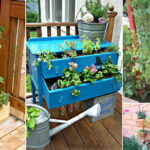Gardening is often lauded as a fulfilling pastime that engages the mind, body, and spirit. This multifaceted hobby not only serves personal interests but also has significant implications on socio-cultural levels. Historically, gardening transcends mere activity, encapsulating essential narratives in agricultural heritage, environmental sustainability, and community building. Examining the intricacies of why gardening is an excellent hobby involves delving into psychological benefits, cultural significance, and ecological impacts.
Psychological Wellbeing and Mental Health Benefits
The act of gardening inherently promotes mental health, playing a critical role in enhancing psychological well-being. Engaging with the earth allows individuals to experience a zen-like state, often referred to as “grounding” or “earthing.” This interaction with nature offers a reprieve from the incessant stimuli of modern life and provides an antidote to urban stressors. Studies reveal that exposure to green spaces leads to reduced anxiety and depression, reinforcing the connection between nature and psychological health.
Furthermore, the physical act of gardening encourages mindfulness. Mindfulness, in psychological terms, refers to the practice of being present, fully engaging with the moment. As individuals tend to plants and observe their growth, they often forget other worries, finding solace in the rhythm of their hands in the soil. Additionally, simple tasks such as planting seeds or watering can foster a sense of accomplishment. Cultivating plants from inception to fruition not only nurtures mental resilience but also provides a tangible sense of achievement—elements vital for improved self-esteem.
The Power of Community and Social Engagement
Gardening has historically been a communal activity, fostering a sense of belonging and shared purpose. Community gardens emerge in urban areas as vital spaces where individuals come together to cultivate not only crops but also relationships. These collective gardening endeavors serve as social equalizers, offering everyone—from diverse socioeconomic backgrounds—the chance to participate in food production and cultural exchange.
Moreover, community gardens have become pivotal in activism for food justice. They empower individuals to reclaim agency over their food sources, addressing issues surrounding food deserts—areas where accessibility to fresh produce is severely limited. By gardening together, communities can combat systemic inequalities related to nutrition and health. This collective ethos underscores the value of gardening past the personal level, positioning it as a vehicle for broader societal change.
Ecological Consciousness and Sustainability
From an ecological perspective, gardening fosters a greater awareness of environmental sustainability. As hobbyists cultivate their own plants, they often transition toward organic practices that reduce reliance on pesticides and artificial fertilizers, consequently promoting healthier ecosystems.
Furthermore, gardening plays a role in biodiversity enhancement, as home gardeners create habitats for various organisms. Native plants attract pollinators like bees and butterflies, critical for maintaining ecological balance. By incorporating biodiversity into their gardens, individuals contribute to the preservation of local flora and fauna, reinforcing the notion that personal hobbies can align with larger environmental missions.
Historical Perspective: Gardening as Cultural Heritage
Examining the historical context of gardening reveals its profound cultural significance. Various civilizations have revered horticulture, making it a pivotal aspect of their societal values and practices. From the ancient Mesopotamians, who utilized irrigation techniques that laid the groundwork for modern agriculture, to the Renaissance gardens of Europe celebrated for their aesthetic beauty, gardening encapsulates historical narratives of innovation, exploration, and adaptation.
Additionally, gardening serves as a living museum of heritage. Traditional cultivation methods, often passed down through generations, encapsulate cultural identities. The preservation of heirloom seeds exemplifies this connection, as they maintain the genetic diversity of crops that have shaped culinary traditions worldwide. With ongoing globalization, these traditions face the risk of being overshadowed. Embracing gardening maintains these heirloom varieties, allowing individuals to connect with their ancestry while promoting food security and agricultural diversity.
Enhancing Personal Development through Horticulture
Gardening offers more than just ecological and psychological benefits; it also provides opportunities for personal growth and skill development. Individuals can enhance various competencies, including patience, responsibility, and problem-solving abilities. The process of nurturing plants, which requires regular attention and care, instills a profound sense of responsibility towards living organisms. This transformation of understanding extends beyond the garden, often inspiring individuals to cultivate patience in other life areas.
Moreover, gardening compels hobbyists to engage in research and continuous learning. Each season presents distinct challenges, from pest control to understanding soil composition. As individuals familiarize themselves with the biological processes at play, they are not merely passive consumers of information; they transform into active learners, fostering a lifelong love for education and inquiry.
Gardening: A Pathway to a Sustainable Future
Through its entwined relationship with sustainability, gardening posits a compelling argument for addressing pressing environmental concerns. The practice encourages awareness of resource management, as hobbyists learn to utilize water efficiently and minimize waste through composting. Gardening thus provides a tangible way for individuals to contribute to sustainability efforts and combat climate change.
Moreover, home gardens support local economies. The rise of urban farming exemplifies this, as individuals increasingly turn to backyard gardening for self-sufficiency. This movement echoes the principles of permaculture, advocating for regenerative practices that utilize the strengths of local ecosystems, thus promoting a sustainable economic model beyond corporate agriculture.
Conclusion: Answering the Call of Gardening
In conclusion, gardening offers an enlightening and multifaceted journey that extends beyond the garden bed. Its psycho-emotional benefits, cultural roots, ecological awareness, and opportunities for personal growth highlight its significance as a hobby worthy of exploration. As individuals engage with the earth and one another, they weave a tapestry of connection that celebrates nature, resilience, and sustainability.
To embrace gardening is to partake in a nurturing tradition that champions both individual well-being and collective responsibility, rendering it an invaluable avenue for personal fulfillment and meaningful contribution to society and the environment. In an era where disconnection is rampant, gardening beckons us back to our roots—both literally and metaphorically.









Leave a Comment